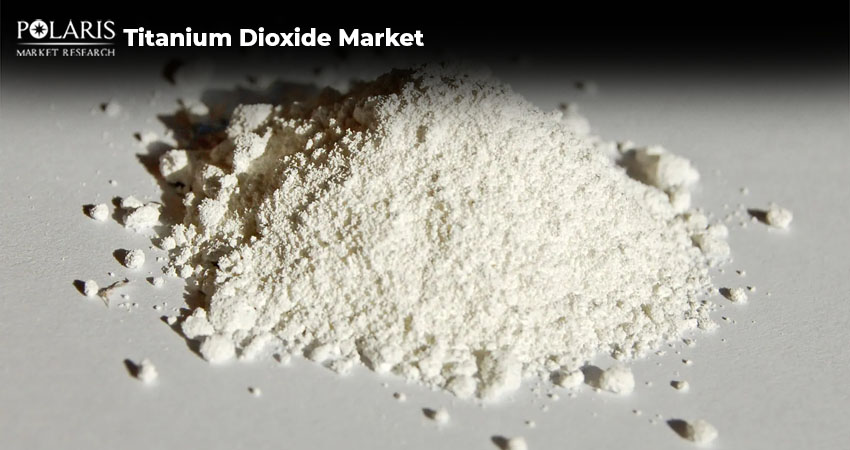Listing Top 10 Companies in the Titanium Dioxide Market 2025

Titanium dioxide (TiO?), also known as the "white wonder," is a vital ingredient in various industries, ranging from cosmetics and food to paint and plastics. Its ability to scatter light, provide opacity, and resist UV radiation makes it indispensable in manufacturing processes. The white, opaque mineral titanium dioxide (TiO?) is found in nature in a variety of crystalline forms, the most significant of which are anatase and rutile.
Curious about the properties of titanium dioxide? And who are the leading global players producing this versatile compound? In this blog, we’ll delve into the details of this intriguing chemical compound. Stick with us!
What Is Titanium Dioxide?
Titanium dioxide is a naturally occurring oxide of titanium, known for its high refractive index, non-toxicity, and brightness. It appears as a white, powdery substance used extensively for its pigment properties. Titanium dioxide generally comes in two main crystal forms: rutile (high density) and anatase (lower density). Despite current concerns about its safety in specific uses, the chemical is praised for its environmental friendliness.
Applications of Titanium Dioxide
- Paints & Coatings
In paints, titanium dioxide offers excellent opacity and whiteness, enhancing coverage and durability.
- Cosmetics
Its non-reactive nature makes it a favorite for sunscreens and skin-whitening creams, providing safe UV protection.
- Plastics
As a pigment, it adds brightness and UV protection to plastic products, ensuring longevity.
- Food
Although some regulatory bodies are reviewing its safety in small quantities, titanium dioxide is used as a food-grade pigment (E171).
Emerging Trends in Market
Regulatory Changes
Titanium dioxide is a "possible carcinogen to humans," according to the International Agency for Research on Cancer's (IARC) classification as a Group 2B carcinogen. Manufacturers are investigating safer versions of titanium dioxide as a result of its categorization as a possible carcinogen.
Sustainability Initiatives
Titanium dioxide is a compound that can be synthesized from its natural oxides or the mineral ilmenite. Companies are investing in eco-friendly production methods, reducing emissions, and improving energy efficiency.
Technological Advancements
Nanotechnology and nanomaterials are transforming a number of industries with its properties. This rise of nanotechnology is enabling the development of ultrafine titanium dioxide particles for specialized applications, such as photocatalysis and smart coatings.
Challenges in Production of Titanium Dioxide
Despite its widespread use over the globe, producing titanium comes with its challenges.
- High Energy Requirement
The process of producing titanium dioxide requires a lot of energy. Since this process is energy-intensive, it raises environmental concerns.
- Regulatory Compliance
As people are getting more and more aware of the environment, governments are imposing stricter regulations that are increasing the cost of the production of titanium dioxide.
- Dependency on Raw Material
Since the titanium feedstocks are limited in nature, this might disrupt the supply chain all across the globe.
Major Companies Producing Titanium Dioxide
- Chemours
As a spin-off from DuPont, the American chemical firm The Chemours Company was established in July 2015. Its headquarters are located in Wilmington, Delaware, in the United States. Chemours is a global leader in the production of titanium dioxide under the Ti-Pure brand. Chemours emphasizes sustainability, with advancements in low-carbon TiO? production. They focus on innovative solutions for paints, coatings, plastics, and laminates.
Founded in 1964, Venator Materials is a prominent international chemical firm with its headquarters located in Stockton-on-Tees, United Kingdom. To encourage sustainability, the corporation has made a number of efforts, such as lowering carbon emissions, improving energy efficiency, and encouraging recycling and waste minimization in their manufacturing operations. Known for its TIOXIDE brand, Venator Materials offers tailored solutions for pigments and functional additives. Their focus on innovation ensures products with superior durability and UV resistance.
- Tronox
Tronox is a chemical manufacturing company that mines and processes minerals to produce titanium dioxide, pigments, and other chemicals. Tronox was founded in 2006 and is headquartered in Stamford, Connecticut, USA. Their products are used in paints, coatings, inks, plastics, paper, and other everyday items while maintaining a strong commitment to environmental sustainability.
- Kronos Worldwide
With its headquarters in Dallas, Texas, USA, Kronos Worldwide is a chemical company that manufactures and sells titanium dioxide (TiO2), a pigment used to make things white, bright, and opaque. It was founded in 1916 and was the first company to develop TiO2 pigments. Kronos Worldwide is renowned for its consistent quality and product reliability.
Tayca is a public company that manufactures and sells industrial chemical products, including titanium dioxide, surfactants, sulfuric acid, and micro titanium dioxide. It was founded in 1919. The company's R&D system is centered on bases in Osaka and Okayama, and corporate headquarters are in Osaka, Japan.
Innovations to Look Out for in Future
- Recycled Titanium Dioxide
Manufacturers are putting efforts in order to create recycled titanium dioxide from industrial waste, minimizing their dependency on raw materials.
- Biodegradable Titanium Dioxide Coatings
New efforts are underway on new formulations aiming to create coatings that decompose naturally, minimizing environmental impact.
- Advanced Photocatalysts
A large number of businesses and researchers are focusing on developing TiO?-based materials for renewable energy applications, such as hydrogen production.
Why Does Titanium Dioxide Matter?
Titanium dioxide is an unsung hero of modern living, doing everything from protecting the skin to making paints last longer. As industries expand, so will the applications and manufacturing processes for this vital molecule. Businesses may contribute to a more sustainable and technologically advanced future by staying on top of market trends and advancements.

